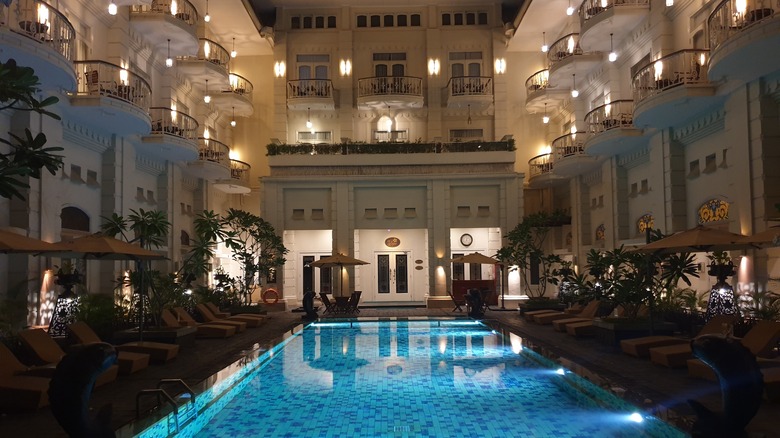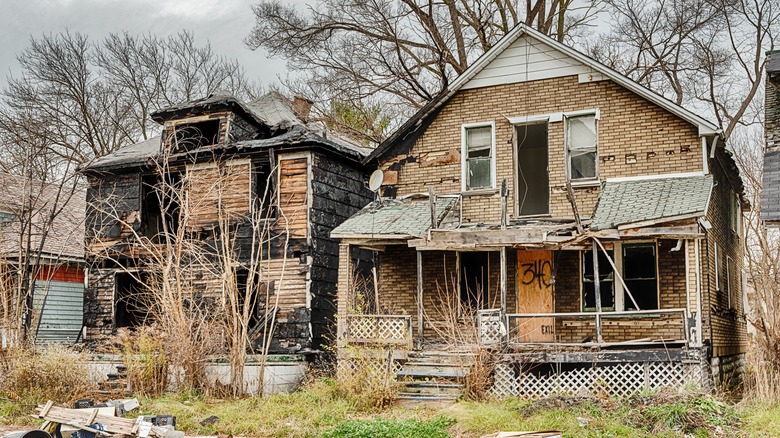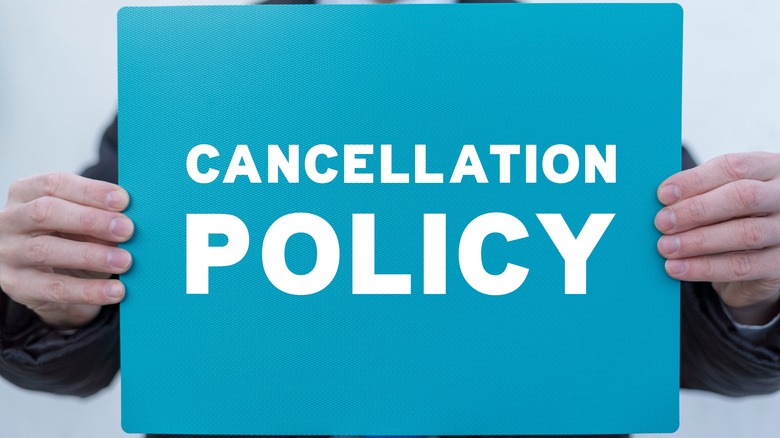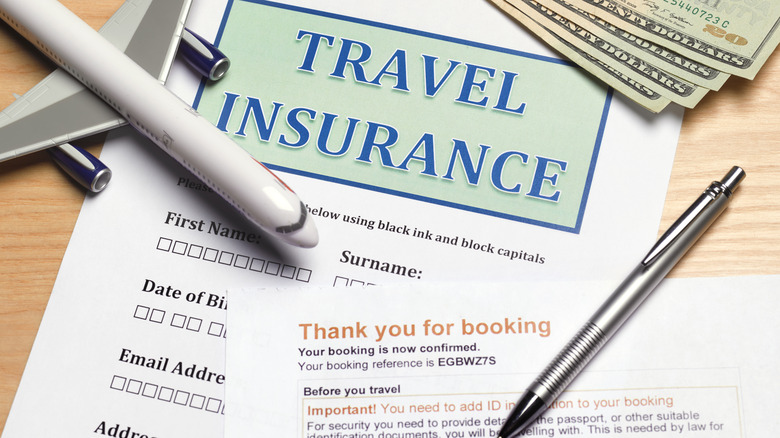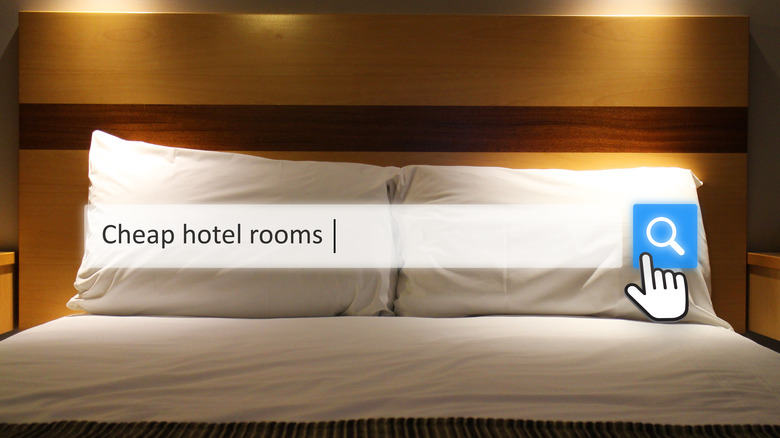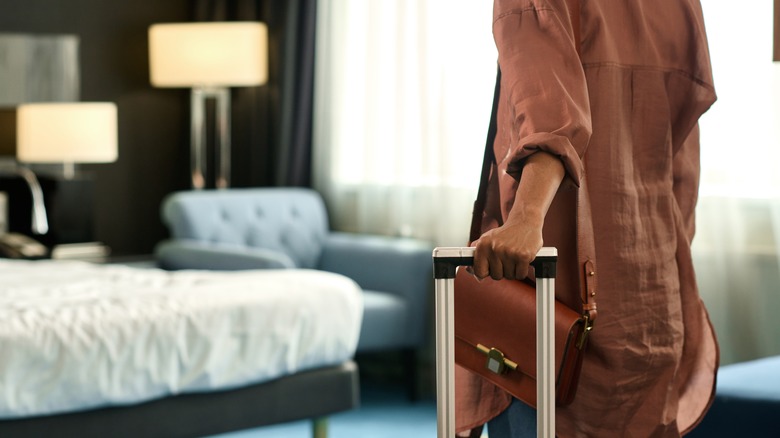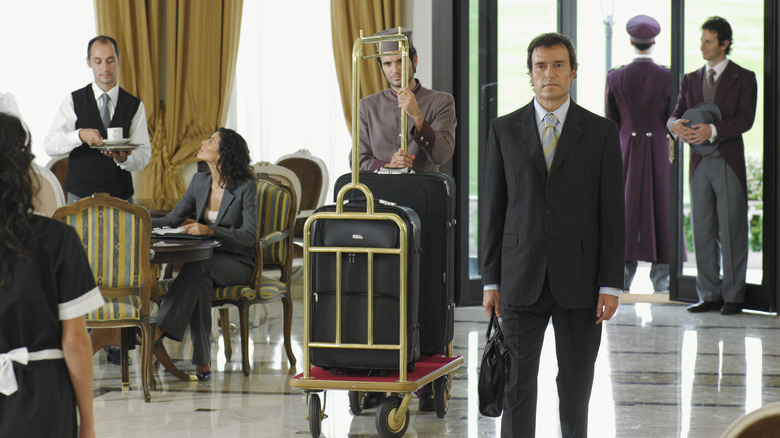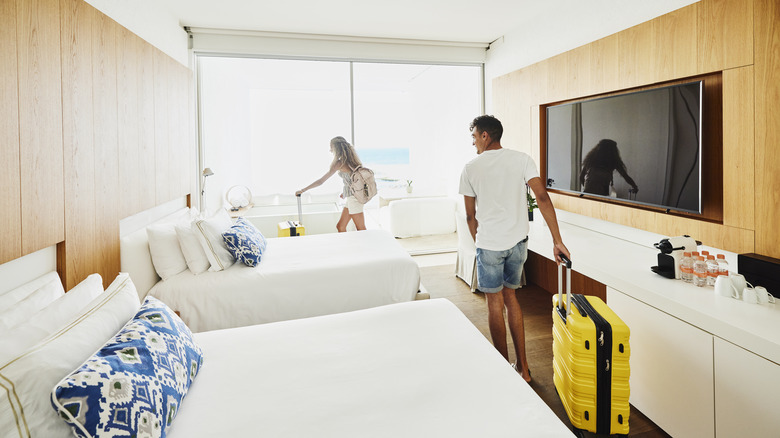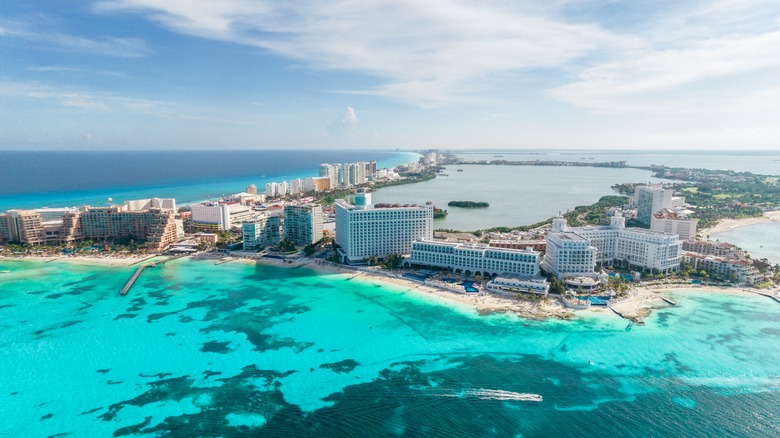The Most Common Mistakes You'll Want To Avoid At All Costs While Booking A Hotel
With the proliferation of independent rentals, booking apps, and hotels, the choices for where you can stay on vacation are endless. Of all the options, hotels have the deepest history and furthest reach — there are hundreds of thousands of hotels spread all over the globe. They range from tiny little inns to giant complexes like the 7,351-room First World Hotel in Malaysia.
Booking a room at a hotel requires that travelers process many factors before hitting the "confirm" button. To untangle the myriad complexities involved in each and every hotel booking, we spoke to an expert in the field. Lynn Farrell, the President of Foremost Travel Group. Farrell, has decades of experience in the travel business, and is intimately conversant with the potential pitfalls of booking a hotel room. Read on for some of her wisdom.
Choosing the wrong location
Picking a hotel in that city might seem a pretty simple task, especially if you're getting a great rate, but by ignoring where the hotel is situated in the city, you can make a huge mistake. "People sometimes see great rates but it is in a bad neighborhood or an unsafe area," explains Farrell. A deal might pop up for a hotel that's $100 cheaper than comparable properties, but if it seems too good to be true, there may be strings attached.
The hotel might be in a part of the city that's not safe to walk around at night, or is rife with crime. Maybe there is lots of construction in the area, or it isn't served by convenient public transportation options. It's important to be cognizant of your hotel's location, so you can feel as safe and secure as possible during your stay.
Choosing a hotel based solely on price
Searching for the rock-bottom price for a hotel room shouldn't be the guiding principle when finding a place to stay. As already mentioned, the hotels with the cheapest rooms might be in bad neighborhoods. They might also be far from where you'll spend most of your time in your destination, so extra transportation costs might outweigh any potential savings. And the price that you first see might actually be a little misleading.
"Choosing a hotel only based on price can be a mistake," says Lynn Farrell. "Many hotels advertise a base rate, but extra fees such as resort fee and taxes can significantly increase the cost (Hawaii is known for adding resort fees!)." When comparing prices, look into the hotel location, final price (when all fees are added), and quality of the hotel to ensure you are comparing apples to apples.
Ignoring the hotel's cancellation policy
Plans change, and sometimes travelers find themselves having to postpone a trip and cancel their hotel room. This can be a frustrating experience if you haven't observed the property's rules. "Make sure you understand the cancellation penalty. When booking with a travel advisor, we can offer you the most flexible cancellation penalties," declares Lynn Farrell.
Cancel too late, and you might be charged the full room rate. Properties that are in more remote locations, like a beach resort in a distant part of South America, or a luxe one with the most luxurious pools, might require that you cancel months beforehand to avoid a penalty. That is because they will find it more difficult to find a replacement guest for the room than a hotel in a busy city, where people are constantly coming and going, and where a canceled room can be quickly filled.
Not having travel insurance
The thing about emergencies is that nobody really sees them coming. They could be anything from a sudden illness or an unexpected injury to an issue with your home. If you have an emergency, and need to cancel your vacation, including your hotel booking, travel insurance can really save the day.
Depending on the coverage offered in the plan you purchase, you can be reimbursed for your entire trip cost if someone in your family gets ill, or you are suddenly called to serve on jury duty, among other reasons. Of course you need to stick to the terms and conditions within the policy, so canceling a trip because of a work commitment might not be covered. Each policy is different, as is the coverage offered, but as a whole, they will help you to recoup costs for a trip you need to cancel because of an emergency.
Choosing non-refundable rate rooms
The cheapest rate for a hotel room is the non-refundable rate. It offers travelers the best price, but it's not always a huge savings, and it comes with a catch that is evident from its name. Book a room at this rate, and you're tied to it. That's because if you don't stay in the room on the date that it's booked, you will forfeit your money.
Non-refundable rates are great if you are 100% sure that you will be at the hotel on the date that you make the booking, but as we all know in life, very few things are 100% certain. It's always better to choose a room rate that allows for changes. These might be known as flexible rate, one that permits cancellation even up to a few days prior to arrival, and can sometimes cost only a few dollars more than the non-refundable option.
Not checking if there are any renovations
Hotels, like homes, cars, and let's be honest, people, need TLC from time to time. They have to get plumbing replaced, electrical upgrades, a fresh lick of paint, furniture changed, and an overhaul of public spaces, to keep ticking along smoothly. While these projects are taking place, some facilities or rooms might be closed. And this can have a great impact on your stay.
Imagine if you are staying at a beachfront resort in the Caribbean, and show up to find that two of the main swimming pools are closed for upgrades? Or that a restaurant that you were looking forward to trying out is shuttered as it undergoes a makeover? Both would sour your vacation. Outside the hotel might be in the midst of infrastructure improvements, with roads dug up, and noisy construction sounds filling the air. Is that the kind of place you want to stay?
Ignoring reviews
Some properties around the world are truly iconic. Examples include The Raffles in Singapore, New York's Waldorf Astoria, and the Ritz Paris. These properties have worked tirelessly to ensure guests are left wanting for nothing, but even then, visitors should check that these grand dames are still up to scratch. That's where hotel reviews come in.
These reviews are important research, and help you to make sure that the hotel is what you expect it to be. This is especially valuable information for a property that you are trying for the first time, or that doesn't come with instant name recognition. When reading reviews, look for a general trend, not just the outliers. All hotels, however good they are, will have some negative reviews, but if the vast majority are positive, then that's a sound indication that the property is a winner. If most of the reviews are bad, steer clear.
Not shopping around
You'd think that a hotel room would be the same wherever you look for it — on the hotel's own website, on an online travel agent booking page — but that's not the case. Hotel prices often vary depending on where you search for them. Some hotels, like IHG Hotels & Resorts, for example, promise a best-price guarantee of the lowest price online on their own site. If they don't, they will offer you compensation.
But some hotels find selling rooms through different channels helps to boost bookings, and they sometimes offer discounts on those sites as an incentive. Whatever the reality, it's always worth shopping around on a few different sites (especially if you want to find accommodations on a budget). And, if this investigation by the UK's "Independent" newspaper is any indication, even within a site, as booking promotions offered on a laptop and a cellphone can vary by a noticeable amount.
Booking the wrong hotel
There are only so many names to give a hotel, and some of them can sound fiendishly similar. Take Hilton for instance, which has the Embassy Suites by Hilton Houston Downtown, Homewood Suites by Hilton Houston Downtown, and Tru by Hilton Houston Downtown Convention Center, as just three of its many properties in the Texan city. That's not the only way to add the wrong property to your booking.
It's also easy to choose a hotel in the wrong destination — there are more than 30 Springfields across the United States, for instance. If you aren't careful, you might book your hotel in the wrong Springfield. Whatever the mistake, reserving a room in the wrong hotel is most likely to be your fault. If you want to be absolutely sure the property is the one you think it is, give it a call, and ask someone at the front desk its full name and location, then check that these match what you see online.
Not asking for perks
Some hotels treat certain guests extra special because they are frequent visitors, or they have attained an elevated status in the hotel's loyalty program. Other properties are generous to guests just because they ask, and use simple tricks to get extra perks when they check in. While many travelers might feel uncomfortable requesting freebies from a hotel, they should realize that the hotel isn't really giving them something for free.
Hotels factor in little perks for guests, they are part of their operating costs, so asking for one doesn't affect the hotel's bottom line. When you book the room, you can call to request benefits like early check-in, a room on a high floor, or special deals at local restaurants and museums. At the point of check-in, you can also inquire about free upgrades, or other freebies like extra toiletries and body pillows. Just remember to be pleasant, and not demanding, when making these requests, and realize that the worst that can happen is that the hotel staff simply say "no."
Not enrolling in a hotel program before booking
Just like airlines and supermarket chains, hotels offer customers loyalty programs. With every stay you rack up points, and eventually those points translate into some sort of reward. That could be a room upgrade, or a free night's stay, or some sort of discount. These programs are free to join, and if you plan to frequently stay in properties that belong to a particular hotel brand, it makes total sense to sign up.
In exchange for handing over some simple details about yourself, you can have access to special offers. These can include rooms offered at members-only rates, free WiFi at properties that don't also offer it for free, and even promotions where guests with memberships get double points for their stay. There really is no reason to not join a hotel loyalty program, you have nothing to lose.
Not comparing rooms
To reduce a hotel down to its rudimentary basics, a hotel is basically a box separated into lots of spaces, some small, some markedly larger. Within that image, it's easy to picture all the rooms being identical in shape, look, layout, but that is a mistake. "Don't assume all hotel rooms are the same-room size, bedding, smoking rooms are all factors to be considered when booking a room," advises Lynn Farrell.
Hotels typically have a number of room categories, starting from the entry level accommodations (the cheapest ones), to the larger ones that are often described using words like deluxe, or suite, or villa (these are also more expensive). Within each category, the rooms will likely vary. Some will have better views, or be quieter, than others within the same price range. It might not be evident from a hotel's website, which is why it's important to call the hotel front desk during the reservation process to make sure you get the room with the specifics that you want.
Not using a credit card
Credit cards are incredibly convenient for making purchases and deferring payment on that purchase for a number of days. They are also great because they offer a level of protection to the cardholder when making those purchases. That applies to travelers making a hotel booking. If your hotel stay is subpar because the property's standard was not as advertised, or your experience is ruined by unexpected events at the hotel, you can certainly try to claim some compensation back from the property.
But if it refuses, your credit card company might be able to claw some funds back through its purchase protection features. Some cards also roll in a degree of travel insurance. And of course they cover you in circumstances of someone using your card number for fraudulent charges (with a fraudulent debit card charge, you might have to just kiss that money goodbye).
Last-minute bookings during a busy period
If you are certain you want to travel somewhere at a busy period of time, don't wait till the last minute to make a booking. Would you try to buy a turkey on the day before Thanksgiving? It's much safer to book a long way ahead of time, though even then hotels have a tendency to overbook rooms, and then cancel on customers. That's when using a travel agent can help. "
When booking with a travel advisor at Foremost Travel, we can book you in hotels that guarantee not to move our clients in an overbooked situation," explains Lynn Farrell. "Do you ever wonder how they pick who doesn't get a room? It is simple ... when an advisor has a relationship with a hotel." Sure, if you are a gambler, wait till the last minute to try to get a room. But be warned, you might have to pay exorbitant rates, or not find any room available.
Thinking that connecting rooms are a given
When you travel as a group, like a family, it's nice to have connecting rooms. It helps to recreate that family bond, when guests can wander between rooms without having to go into the hallway, It's almost like a mini home away from home. But asking for connecting rooms and getting them are two different matters. "Most hotels and resorts have a limited number of connecting rooms," declares Lynn Farrell. For starters, you need to be sure that the hotel you want actually has such a feature.
"If you book two ocean-view, king-bedded rooms and the resort doesn't have those two rooms that actually connect, you will be disappointed when you arrive. We here at Foremost Travel work with resorts to get advance confirmation for connecting rooms. Our clients will have this in writing prior to arrival." Guests that try to book them independently often find calling the hotel is the only way to secure connecting rooms.
Not bundling a hotel with airfare
It's a common sight when using an online travel agent, to see a tab that lumps together fights and hotels. This is an easy way for a traveler to search for the two main components of a trip in one fell swoop. Not only is it convenient, it can also be a financial plus. "Consider booking flights with your hotel, you may get a better deal when you book them together," notes Lynn Farrell.
For some travel agents, they can have extra inventory of hotel rooms and airline seats that they want to sell at the last minute. Offering them as a package, perhaps at a discount, is a great way to reduce that inventory quickly. Travelers should note though that this sort of deal sometimes comes with limited choice of flights and places to stay, and the cancellation policies can be quite strict.
Not booking a new hotel before it opens
Before a hotel fully debuts, it has what is known as a soft opening, a time when it accepts guests, but gives them a reduced room rate as it works out any kinks in its operations. It's a win-win situation — hotels can fine-tune their product, and travelers that are happy to endure (hopefully) minor issues get a cheap room. So booking a hotel before that opening can be a huge windfall for a traveler. "Hyatt's Inclusive Collection is opening two new resorts in Punta Cana in April 2025 — Secrets Playa Esmerelda and Dreams Playa Esmerelda," mentions Lynn Farrell.
"They have just started selling these resorts, and you can save big (up to a 50% savings for a five-star resort) booking now for the summer. They offer great deals prior to opening!" If you want to try a new property at a bargain rate, consider this tactic.
Not using a travel advisor
Some people like to fix their cars themselves. Others take their vehicle to a trusted mechanic. You can think of a travel agent as a mechanic for your trips, one that can identify the pitfalls, and help you to avoid them. In addition to being skilled in their trade, they have other tricks up their sleeve that the average traveler can't compete with. Advisors that work with hotel brands, cruise lines, and airlines repeatedly create deep relations and special connections with them, and can have access to perks as a result.
This could be credits on a cruise ship, or complimentary room upgrades at a hotel. They might also be deeply familiar with specific traveler needs, like the best all-inclusives in the Caribbean for adults. Agents also understand the intricacies of a trip, and are nimble stitching together an itinerary that works for you — call it proficiency through practice. Some advisors have insider knowledge of a hotel that can be very handy, and if you run into problems during the trip, you'll have someone to advocate for you. What's not to love about that?
